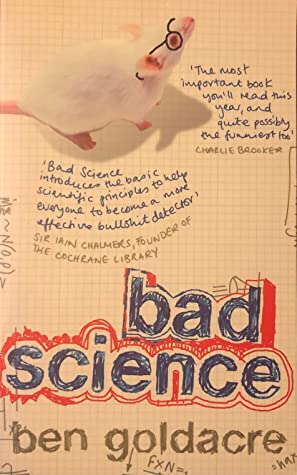Alex Danvers reviewed Bad Science by Ben Goldacre
"Maintenance Phase" for Medicine
5 stars
Ben Goldacre is a physician in the UK who writes with energy and humor about his field: medicine. He is a sort of anti-Malcolm Gladwell. Instead of spinning mythic narratives about the wonders of science, he explains how hard doing good science is and how common it is for scientists--including physicians and medical researchers--to get things wrong. This book is over a decade old, so it may be less surprising to hear in 2023 that institutions--even those as solid as medical research--have a tendency towards suppression of dissent. But it still felt fresh to read about the many ways that medicine has taken wrong turns in evaluating evidence and assigning treatments. Science makes progress, but it's often not in a straight line.
This book connects with the broader rise of Evidence-Based Medicine as a movement in the late 1990's. Goldacre shares some surprising statistics about how much of standard …
Ben Goldacre is a physician in the UK who writes with energy and humor about his field: medicine. He is a sort of anti-Malcolm Gladwell. Instead of spinning mythic narratives about the wonders of science, he explains how hard doing good science is and how common it is for scientists--including physicians and medical researchers--to get things wrong. This book is over a decade old, so it may be less surprising to hear in 2023 that institutions--even those as solid as medical research--have a tendency towards suppression of dissent. But it still felt fresh to read about the many ways that medicine has taken wrong turns in evaluating evidence and assigning treatments. Science makes progress, but it's often not in a straight line.
This book connects with the broader rise of Evidence-Based Medicine as a movement in the late 1990's. Goldacre shares some surprising statistics about how much of standard medical guidelines are actually based on rigorous, peer-reviewed science as opposed to intuition and tradition (around 25%, based on the research he cites). That's a shocking number, and it's a good corrective for the tendency to view physicians as infallible and always making The Right Call based on Science. Viewed as an early summary of the impetus behind that movement, this book is a valuable bit of history: "here's how we viewed medicine in the middle of early reform efforts."
Of course, there are modern critiques of Evidence-Based Medicine (critiques that could also be applied to modern "replication crisis" reform in social science) that don't get addressed. Doing a double-blind randomized clinical trial is a great way to make absolutely certain that a treatment works. But doing a double-blind RCT for every possible treatment--or variation on treatment--that physicians might recommend is implausible. Instead, a deeper appreciation of underlying theory, and how that theory makes some effects and mechanisms plausible (or implausible!) is needed to sort out what ultimately gets the RCT treatment.
Overall, however, I thought the book was engaging, well-written, and full of surprising facts that made me more aware of the holes in our medical knowledge. I'd recommend it to fans of the podcast Maintenance Phase: people who are happy to see myths about healthcare exploded with a sense of humor.


